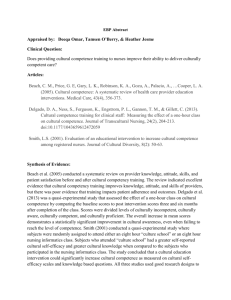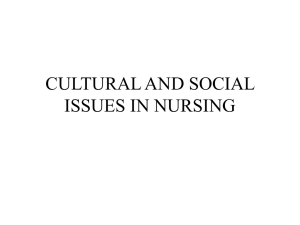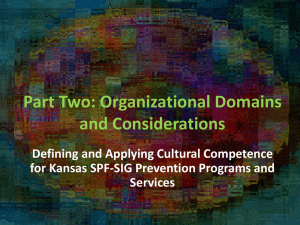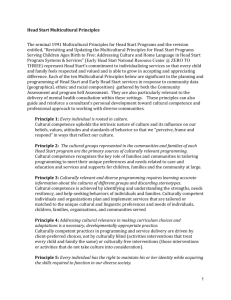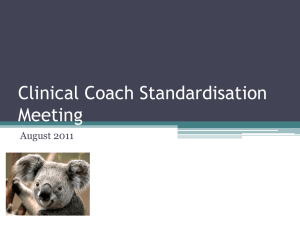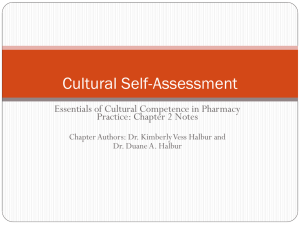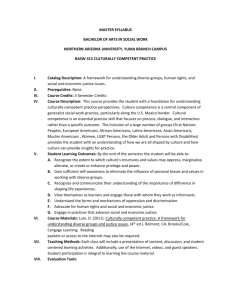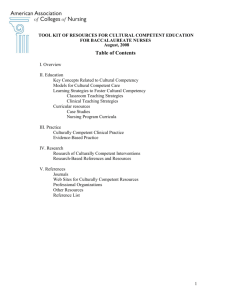case management paper
advertisement
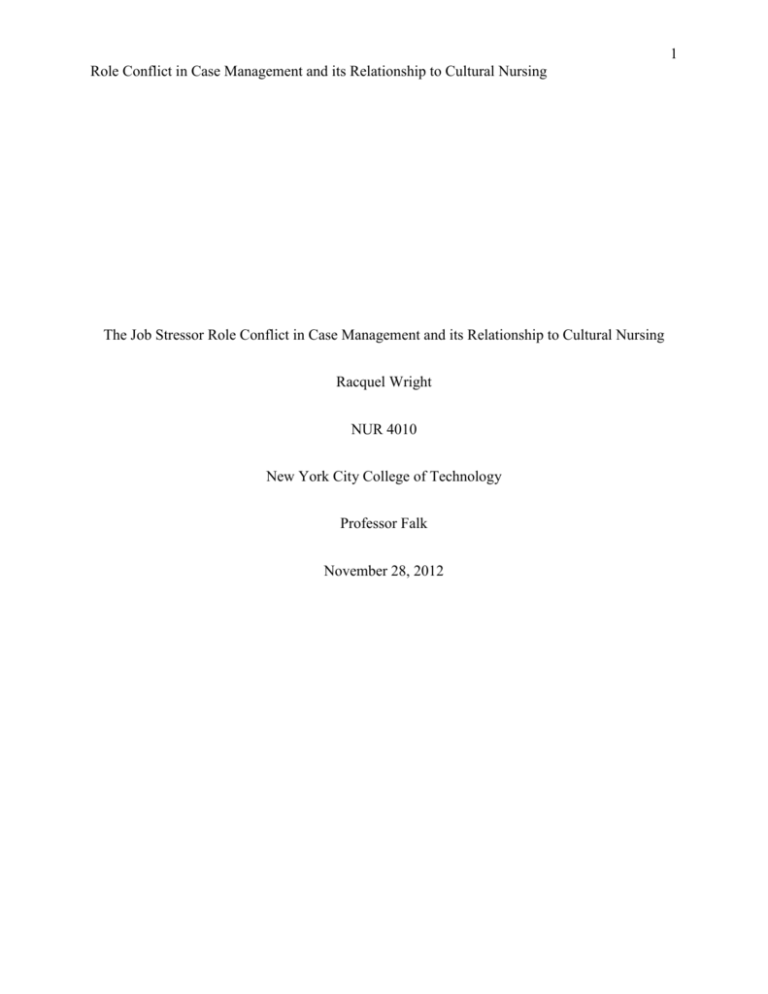
1 Role Conflict in Case Management and its Relationship to Cultural Nursing The Job Stressor Role Conflict in Case Management and its Relationship to Cultural Nursing Racquel Wright NUR 4010 New York City College of Technology Professor Falk November 28, 2012 2 Role Conflict in Case Management and its Relationship to Cultural Nursing Role conflict occurs in almost every profession especially those including multiple factors and individuals lives. Role conflicts may include religious, ethical, and personal conflicts that occur from day to day for case manager. To ensure that the case manager is an effective at what he/she does, they must first evaluate their own issues and beliefs before being able to effectively help others make decisions regarding their health without imposing their own personal biases. In this paper I will discuss how the job stressor role conflict is and why it is of importance to case management. I will describe how having role conflicts can influence the case manager's practice of being culturally competent. I will also discuss how being culturally competent can improve the case management practice. Overall, case managers are faced with this problem and found prospective on how to deal with such dilemmas without offending different cultures from their own in the process. What is role conflict? Role conflict is a job stressor that occurs when "case managers execute their role one way while the defined role is something else; that is, when there is a mismatch between role definition and role acceptance" (Powell & Tahan, 2010). Role conflict has also been defined as stress resulting from multiple job requirements that are perceived as incompatible because divided loyalties or accountabilities (Smith, 2011). Role conflict and strain occurs from many different factors in the job's description, ranging from the case manager's professional identity and self image, interactions, relationships, time task orientation and business and financial objectives. There are also other means for role conflicts to occur for the case manager in the workplace. Role conflict can occur as ethical dilemmas. For example, as a case manager, the job consists of performing a balancing act, framing contentious opinions, speaking for the vulnerable and assuming responsibilities without power are a few tasks of the case manager. The case 3 Role Conflict in Case Management and its Relationship to Cultural Nursing manager will have to deal with frail patients without sufficient funds to continue to receive care from the healthcare facility and no access to the essential resources they may need for their health. The case manager is then faced with the situation of having loyalties to the facility, their employer, being paid and the patient, as their advocate, who cannot fund their expenses (Smith, 2011). The example just given is a frequent dilemma experienced by the case manager. Role conflict mainly occurs due to role ambiguity on the case manager's part and them assuming roles that are a part of their job description. What is role ambiguity? Role ambiguity is according to Jamison et al. the basic socialpsychological problem encountered during implementation. Many case managers experience anxiety and confusion performing their job due to this role ambiguity. Now the question is what the case manager's job is exactly. Currently, according the ANA code of ethics, the role of the nurse case manager is advocating for the patient's health, safety, and their rights. To help lessen the levels of ambiguity in the case management profession, the clinical practice of the case manager has to have clearer defined boundaries. Also ethical committees should be readily available to the case managers and as a requirement case manager should be trained in mediation, negotiation, and conflict resolution in order to help lessen this role ambiguity and make them more culturally competent (Smith, 2011). Being culturally competent is imperative as a case manager. The case manager being culturally competent can help lessen the frequency of role conflicts they may have in the work place due to misconceptions they many have of the different cultures they meet. How should the case manager go about becoming culturally competent? In order for the case manager to become cultural competent, the case manager has to be informed of the ethno-cultural dynamics of the patient's in order to make informed decisions regarding what best fits the client's needs and 4 Role Conflict in Case Management and its Relationship to Cultural Nursing lifestyle. There are many different factors including the client's age, class, cohort amongst the residents which can lead to misunderstandings and conflicts. Also different cultures communicate differently and have different work habits and understandings of how care should be provided and its overall quality. As a case manager, he or she has to be mindful and consider all of these factors without compromising their quality of work and offending others they are exposed to (Werkmeister-Rozas & Klein, 2009). Role conflict in case management that is influenced by cultural competence can be demonstrated in the following example. An 84-year-old man, James, has a diagnosis of pancreatic cancer and was given 3 months to live. The MD has provided him with the option of aggressive radiation with 4 cycles of chemotherapy to help reduce the size of the tumor. His family wants anything that is possible to be done for him, to be done while James does not want to fight anymore. The case manager has to knowledge of this situation and he knows that the radiation and chemo will kill James before the cancer actually does. He also feels conflicted because of this ethical conflict. On the exterior, it may seem that the case manager is supporting the death of James, but he is actually advocating for him. After listening to James' concerns, it is up to him to listen to what he wants essential and use the knowledge he has to explain to the family what may occur if they go through with the treatment and the suffering he will experience, which in all actuality, will be worse. Cultural competence can dramatically reduce role conflict. Cultural competence in case management improves the case management practice in many ways. Being culturally competent isn't only about the acquisition of skills but also development of sensitivity that acknowledges that there is always difference when within cultural groups. Case managers play a pivotal role in navigating the complexity of diversity in the worker- client relationship. Therefore the case 5 Role Conflict in Case Management and its Relationship to Cultural Nursing manager has to seek the highest level of cultural competency as a part of the profession. To be effective in cultural competency and reduce role conflicts, the case manager to first evaluate themselves and recognize how their beliefs, attitudes and feelings may influence their decision making. This requires them to be aware of and connect to multiple aspects of an individual's cultural makeup including the way they may grieve, celebrate, help, and protect and plus the already know language, values, customs, and traditions (Werkmeister-Rozas & Klein, 2009). Because cultural competence is important to case management it has to be implemented in the workplace to reduce the conflict between the case managers, patients, other healthcare providers, the insurance company, and the and healthcare facility. For example, members of the Jehovah witness religion do not favor blood transfusions. A 24-year-old patient, who is Jehovah's Witness, was in a car accident and lost masses of blood during her life saving surgery but it is vital that she has this blood transfusion in order to recuperate from the surgery. The case manager has to be aware of this religious group's belief systems and then has to explain the importance of this life saving procedure for this individual because she is young and has her whole life ahead of her. The case manager knows his position and his beliefs and can therefore effectively explain all aspects of the procedure to the family without any bias influencing them and they agree to the procedure. This example shows cultural competency can improve the case management practice by reducing role confusion and ambiguity, establishing a rapport with patient's, their families, and coworkers. The way an individual sees optimum health varies. Health and illness issues are concepts based on how the individual perceives, experiences, and manage health and illness based on their cultural group. What one group may perceive as respectful care another group may find it disrespectful, insulting, and offensive. This is why implementation of how to provide culturally 6 Role Conflict in Case Management and its Relationship to Cultural Nursing competent care is essential in the workplace. As a healthcare provider, the main role is providing care that crosses all cultural boundaries while being culturally sensitivity. This is why cultural competence is important. This type of care prevents conflicts in the decision-making process the case manager may experience that may leave him or her frustrated and the patient feeling guilty and alienated (DeRose & Kochurka, 2006). A benefit of cultural competence includes effective in successful patient-centered transition of care (National Transitions of Care Coalition, 2012). To first begin the path to cultural competency for each patient the case manager has to evaluate the patient's history, physical status, their personal views of health and the care they should receive, and their functional level to help create a plan of care specifically for that patient. This overall leads to better patient outcomes because of the better care plan (DeRose & Kochurka, 2006). Role identity is the main goal of the case manager to provide the proper services to each client. To also help do so the case manager should adapt cultural practices that neither helps nor hinders. This also increases the likelihood that the patient will adhere to the plan of care after discharge because it is consistent with their cultures values and practices. The case manager also has to obtain background information of the patient's culture. This cultural knowledge helps the case manager and the patient develop a relationship, prevent any misunderstanding by providing the opportunity to ask the right questions, and identify what the patient values in order to incorporate that into their care as well (DeRose & Kochurka, 2006). Some characteristics the case manager can adapt as a part of their culturally competent includes being caring empathic, openness, and flexibility. Also the case manager can learn new or improve their communication skills. This can be done by adjusting their eye contact pattern, space, and conversation space to that of the patient's family to promote the relationship building 7 Role Conflict in Case Management and its Relationship to Cultural Nursing process. The case manager should also allow the patient to express him or herself openly and freely. This allows the case manager to gain an understanding of the patient's views and the patient to speak without the feeling of having to defend himself or herself. No one is perfect and when dealing with different ethnic backgrounds, problems may still develop. When this occurs, the case manager should apologize and express regret about their offensive behavior and their desire to learn more to prevent this error from occurring again (DeRose & Kochurka, 2006). All the views above expressed are ways cultural competence reduces role conflict and confusion and improves the case manger's efforts to building a plan of care of every unique individual. In conclusion, case managers experience all types of conflicts while working with multicultural patients and their families. As the case manager, one encounters individuals from all parts of the world with different beliefs and it is up to them to be culturally competent in those different areas to establish the best care plan for those different individuals based on their different lifestyles. Building a rapport, knowing the proper ways to communicate, and understanding what that individual's values are all vital factors in case management and cultural competency. By the case manager doing the background information of the patient's cultural beliefs and values, this lessens the possibility of him or her experiencing role conflict. In addition, the case manager has to also evaluate his or her beliefs to ensure that he or she is not experiencing any biases, which can influence the outcome of the patient's care plan and whether or not they may adhere to it. These are just a few examples of how role conflict can influence cultural competency in case management. 8 Role Conflict in Case Management and its Relationship to Cultural Nursing References DeRose, N., & Kochurka, K. (2006). Implement culturally competent healthcare in your workplace. Nursing Management , 18-26. National Transitions of Care Coalition. (2012). Cultural Competence: Essential Ingredient for Successful Transitions of Care. Retrieved November 22, 2012, from National Transitions of Care Coalition: http://www.ntocc.org/Portals/0/PDF/Resources/CulturalCompetence.pdf Powell, S., & Tahan, H. (2010). Case Management: A Practical Guide for Education and Practice. Philadelphia, PA: Lippincott Williams & Wilkins. Smith, A. (2011). Role Ambiguity and Role Conflict in Nurse Case Managers: An Intergral Review. Professional Journal of Case Management , 182-196. Werkmeister-Rozas, L., & Klein, W. (2009). Cultural Responsiveness in Long-Term-Care Case Management: Moving Beyond Competence. Springer Publishing Company , 2-7.
